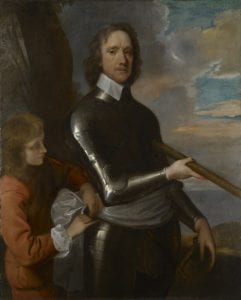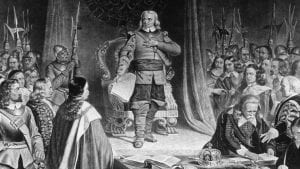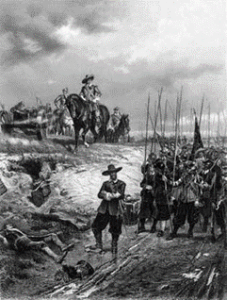Blog by Lily Smith
Since we are all in a Civil War mood the last few weeks, we thought that we should talk more about Oliver Cromwell. Cromwell, was an English general and statesman who led Parliamentary armies against King Charles I’s Royalist forces during the English Civil War. During the war, Cromwell became well known for his ruthlessness in battle, and was quickly promoted from commander of a single cavalry troop to being one of the principal leaders of the New Model Army, who played a key role in the defeat of the Royalist army.  After the death of Charles I, Cromwell dominated the Commonwealth of England as a member of the Rump Parliament and was subsequently elected to command the English campaign in Ireland in 1649. His forces occupied the country and brought an end to the Irish Confederate Wars. Cromwell also led an attack against Scotland in 1650. In 1653, Cromwell dismissed the Rump Parliament, and set up a short-lived Barebone’s Parliament, and his fellow leaders invited him to rule as Lord Protector of the Commonwealth of England. Cromwell died of natural causes in 1658, and was succeeded by his son Richard, whose weakness led to the Royalist’s return to power and the re-establishment of King Charles II.
After the death of Charles I, Cromwell dominated the Commonwealth of England as a member of the Rump Parliament and was subsequently elected to command the English campaign in Ireland in 1649. His forces occupied the country and brought an end to the Irish Confederate Wars. Cromwell also led an attack against Scotland in 1650. In 1653, Cromwell dismissed the Rump Parliament, and set up a short-lived Barebone’s Parliament, and his fellow leaders invited him to rule as Lord Protector of the Commonwealth of England. Cromwell died of natural causes in 1658, and was succeeded by his son Richard, whose weakness led to the Royalist’s return to power and the re-establishment of King Charles II.
One of Cromwell’s greatest motivations was for Protestants to have the ability to worship God in the way they thought was correct. As a Puritan, he wanted England to become godlier, championing specific behaviours such as sobriety, piousness, and better manners. This attitude backfired, however, with many ordinary people disagreeing with his rules. Despite Cromwell’s dislike of the rules of the Church of England under the rule of Charles, he was extremely harsh on those who he perceived to be a threat to the Protestant Church, with his policy of religious tolerance not extending to those he considered to be heretics, such as Quakers, Socinians, and Ranters.
Similarly, Cromwell’s views and actions regarding Parliament were often contradictory. He was a firm believer in the importance of Parliament and working closely with MPs. Despite this, he dismissed Parliament twice by force during his rule, and often argued with said MPs. His power relied largely on the support of the army, so in order to work with Parliament to pass laws, he had to attempt to keep both the army and the MPs happy. This proved difficult, as the army and MPs often disagreed with each other; the MPs disliked the army and the high taxes required to finance it, and the leaders of the army (often political and religious radicals with extremist views) distrusted the MPs, many of whom would have re-instated Charles I after the first Civil War. Cromwell’s dismissals of his Protectorate Parliaments led to the country eventually being ruled by his major generals; essentially, a military dictatorship.
Cromwell’s biggest motivation for his campaign in Ireland was the threat of a Royalist invasion, due to the monarchy’s continued support in Ireland. However, Cromwell had a more personal vendetta against the Irish, due to the large Catholic population, as well as a hunger for revenge for a massacre of English Protestants in Ireland in 1641. Cromwell’s eagerness to crush the Irish forces was apparent throughout the course of his attacks, with his army slaughtering soldiers and civilians alike in a number of brutal battles. In the siege of Drogheda in September 1649, Cromwell even joined in on the massacre, ordering his men to kill all priests, monks, and nuns. These actions have led to Cromwell’s measures being categorised as genocidal.
One of Cromwell’s most controversial and memorable actions was the cancellation of Christmas. During his reign as Lord Protector, shops and markets were ordered to stay open on Christmas Day, and soldiers were ordered to patrol the city and seize any food they found being prepared for Christmas. However, the contempt of Christmas did not begin with Cromwell. Rather, Puritan leaders had been voicing their dislike of religious celebrations they considered frivolous (i.e., Christmas) since the mid 1500s. These Puritans held the belief that said celebrations threatened Christian beliefs, encouraged immoral activities, and dishonoured God. Legislation protesting these festivals had been enacted before Cromwell’s reign, and in 1645, Parliament produced a Directory for Public Worship that advised that these days of celebration should be spent in respectful contemplation rather than celebrated. From then until 1660, Christmas was officially illegal. However, there is no evidence to suggest that Cromwell played a prominent role in formulating and advancing the legislation restricting Christmas celebrations. Regardless, our knowledge of his beliefs and faith can allow us to assume that he was sympathetic towards the cause, due to his support of the enforcement of the measures. Although Cromwell himself did not initiate the abolition of Christmas, his rise to power definitely catalysed it.

Actions like these have solidified Cromwell as one of the most controversial figures in British history. Many have claimed him to be a villain, a dictator, and a fascist. During the Civil War, Cromwell was a brutal military leader, who did not stop fighting until the opposition had been destroyed. Whilst it can be argued that war is always bloody and brutal, his conquest of Ireland showcased his bigotry and violence due to his contempt for Catholicism. Although some historians claim Cromwell didn’t directly give the order to murder civilians, as commander-in-chief of the army, the responsibility for the army’s actions lies with him. Furthermore, although Cromwell disagreed with the monarchy, his hunger for power turned him into somewhat of a hypocrite. Despite his Puritan beliefs, he behaved like a monarch when acting as Lord Protector, going so far as to have people address him as ‘Highness’.
However, some people see Cromwell as a hero, due to his blunt and no-nonsense attitudes. Utilising the example of the conquest of Ireland, it can be argued that Cromwell did the only thing a leader could do in that situation in order to defend his nation. Much of the evidence painting Cromwell in a negative light is contradictory, with some modern historians claiming that Cromwell actually avoided the killing of civilians during his campaign in Ireland. As Lord Protector, his actions were motivated by sincere religious beliefs, and when he was offered the crown in 1657, he stayed true to his republican beliefs and denied it due to the philosophical and moral implications. However, due to the contradictory historical evidence and highly biased accounts of the English Civil War, it is difficult to ascertain whether Cromwell was indeed a hero or a villain. However, here in Bristol we are all proud that our very own Dr Stuart Prior is a descendant of the famous man!

